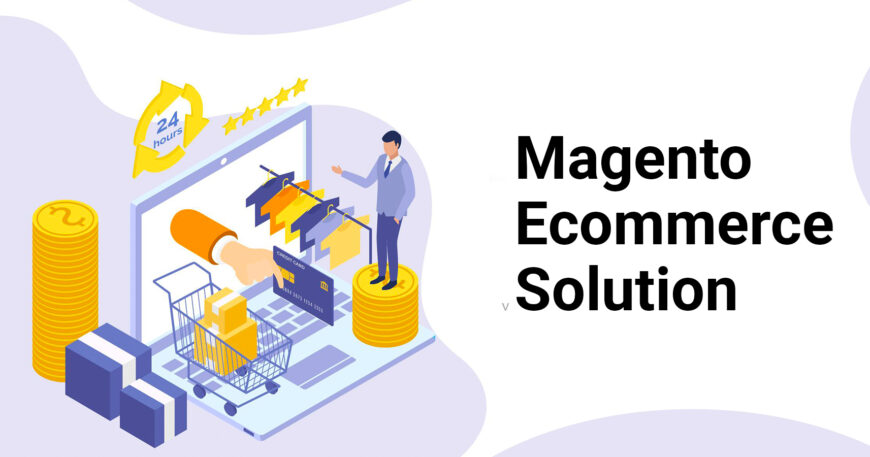In today’s digital age, having a solid online presence is crucial for businesses of all sizes. Ecommerce platforms provide the foundation for establishing and managing an online store, enabling companies to reach a global customer base and drive sales. Two prominent players in the ecommerce platform market are Shopify and Magento ecommerce solutions.
Shopify and Magento ecommerce solutions are renowned ecommerce platforms that offer a wide range of features and functionalities to facilitate online selling. Both platforms have gained popularity due to their robustness, scalability, and user-friendly interfaces.
In the following sections, we will explore various aspects of both platforms, highlighting their similarities, differences, and key considerations to help you make an informed choice for your ecommerce venture.
1. Cost of Ownership
The basic pricing for Shopify starts at $29 per month, which includes hosting and access to essential features. On the other hand, Magento’s Community Edition is free to use. Still, businesses need to consider hosting fees, which can vary depending on the hosting provider and the specific requirements of the website.
Regarding enterprise-level pricing, the transcript suggests that Magento ecommerce solutions may be more cost-effective in some cases. While specific pricing details may vary based on individual agreements and negotiations, Magento’s enterprise solutions are generally considered more affordable than Shopify. Magento offers a range of enterprise options, including Magento Commerce, which provides additional features and supports tailored to larger businesses.
2. Platform Customization
Magento’s open-source nature allows businesses to modify and customize the code according to their requirements. This level of customization allows for greater control over the functionality, appearance, and user experience of the ecommerce website. Access to the source code will enable businesses to implement unique features, integrate third-party extensions, and tailor the platform to align with their brand and business processes.
In contrast, Shopify is a closed-source system, meaning that the underlying code is not accessible for modification. While Shopify offers a range of customization options through its theme editor and app integrations, there are limitations to the extent of code customization. Businesses using Shopify can customize the platform within the framework provided by the platform, but they have a different level of freedom than with Magento’s open-source architecture.
3. Product Flexibility
Magento ecommerce solution offers extensive support for various product types, allowing businesses to sell simple, configurable products with customizable options, bundled, downloadable products such as software or e-books, and virtual products that do not require physical delivery. This flexibility in product types enables businesses to cater to a wide range of industries and offer diverse product offerings to their customers.
In contrast, Shopify has limitations in terms of product types, as it primarily focuses on selling simple products. While businesses can add variations and options to their products, the range of product types supported by Shopify is more limited than the Magento ecommerce solution. It may be a consideration for businesses that require a more extensive range of product types for their ecommerce operations.
4. Managing Multiple Stores
Magento ecommerce solution excels in managing multiple stores from a single administrative panel, making it a convenient choice for businesses with numerous storefronts. With Magento’s multi-store functionality, companies can create and manage multiple websites with a unique domain, design, and product catalog. This centralized approach simplifies the management process, allowing businesses to efficiently handle various storefronts and tailor the customer experience for different brands, regions, or product lines.
In contrast, Shopify operates on a one-to-one relationship for managing storefronts. Each Shopify store is associated with a single domain, and managing multiple stores requires separate Shopify accounts. While businesses can still operate multiple stores on Shopify, the management process could be more cohesive than Magento’s centralized approach. It can be a crucial factor for companies with complex multi-store requirements.
5. B2B Ecommerce Features
Magento ecommerce solution offers comprehensive built-in features designed explicitly for B2B ecommerce. These features cater to the unique needs of businesses primarily operating in a business-to-business context. Magento’s B2B features include the following:
- Custom Pricing and Quoting: Magento allows businesses to set up personalized pricing structures based on customer groups, enabling negotiated pricing, volume discounts, and contract-based pricing. It also supports quote management, allowing customers to request quotes for specific products or services.
- Account Management: Magento ecommerce solution provides advanced tools for managing B2B customer accounts. Businesses can create and manage multiple buyer roles within a single organization, define specific permissions and roles for different users, and establish hierarchies for account management.
- Catalog and Product Customization: Magento enables businesses to customize their catalogs and products to meet the specific requirements of B2B customers. It supports complex product configurations, customizable options, and flexible pricing structures, empowering businesses to offer highly personalized and configurable products.
- Advanced Order Management: Magento ecommerce solution offers robust order management capabilities for B2B ecommerce. Businesses can handle complex ordering processes, including multiple shipping options, bulk order processing, backorder management, and integration with third-party order management systems.
Shopify, while capable of supporting B2B ecommerce, has more limited native support for B2B features compared to Magento ecommerce solutions. Shopify does provide some B2B functionalities through apps and extensions available on the Shopify App Store. However, businesses requiring a comprehensive and integrated suite of B2B features may find Magento’s built-in capabilities more suitable for their needs.
6. Customer Group Segmentation
Magento’s customer group segmentation feature allows businesses to categorize customers into groups based on criteria such as customer type, purchase history, location, or custom attributes. This segmentation capability will enable enterprises to customize the shopping experience, pricing, promotions, and product offerings for different customer groups.
In contrast, Shopify does not have a similar native feature for customer group segmentation. While third-party apps on the Shopify App Store provide some segmentation functionality, they may offer a different depth and integration than Magento’s built-in customer group segmentation. For businesses that require extensive customization and control over customer segments, Magento’s native capabilities may be more suitable.
7. International Ecommerce
The Magento ecommerce solution is advantageous in managing multiple stores for different regions, making it a favorable choice for businesses targeting international markets. With Magento’s multi-store functionality, companies can create and manage separate storefronts for other areas, each with localized experiences in language, currency, pricing, and shipping options.
On the other hand, Shopify operates on a one-to-one relationship for managing storefronts. Each Shopify store is associated with a single domain, which can limit the scalability and flexibility of businesses targeting multiple international markets. While Shopify offers some internationalization features, such as currency conversion and language localization, the ability to manage separate storefronts for different regions is not as native and seamless as it is in the Magento ecommerce solution.
8. Selling High-Risk or Controversial Items
Magento ecommerce solution takes a permissive approach when selling high-risk or controversial items, as long as the sales are legal and comply with applicable regulations. It means businesses using Magento ecommerce solutions can sell products such as guns and ammunition, provided they adhere to the legal requirements governing these sales.
In contrast, Shopify imposes restrictions on selling high-risk or controversial items. The platform lists prohibited items that cannot be sold, including firearms, ammunition, tobacco products, adult content, and other restricted or regulated items. Shopify’s restrictions aim to ensure compliance with legal and ethical standards and maintain a consistent brand image across its platform.
9. PCI Compliance and Security
Shopify provides built-in PCI compliance and security upgrades as part of its platform. The platform ensures that the infrastructure and systems comply with the Payment Card Industry Data Security Standard (PCI DSS), which governs the security of payment card information. It relieves store owners of the burden of managing and maintaining PCI compliance themselves.
On the other hand, Magento places the store owner’s security responsibility. While the Magento ecommerce solution provides robust security features and guidelines, store owners must actively manage and implement security measures to ensure compliance with PCI DSS and other security standards. It may involve working with certified developers, conducting security audits, and following best practices for secure hosting and data protection.
10. Developer Availability and Expertise
Shopify, as a closed-source platform, has a larger pool of developers available due to its popularity and accessibility. The closed-source nature of the platform makes it easier for developers to work with and build upon Shopify’s existing framework. This larger pool of developers increases the availability of skilled professionals who can assist businesses with their Shopify projects, customization, and ongoing support.
In contrast, while relatively fewer in number than Shopify, Magento developers often need to gain more specialized knowledge and expertise in working with the Magento ecommerce solution. Magento’s open-source nature and flexibility for code customization require developers with a deeper understanding of the platform’s architecture and capabilities. This specialized expertise can result in higher costs for hiring Magento developers than their Shopify counterparts.
Conclusion
When choosing an ecommerce platform, evaluating your business needs, growth plans, budget, and technical expertise is crucial. Consider factors such as the complexity of your products, target audience, customization requirements, international expansion goals, and the level of B2B functionality you require.
By thoroughly assessing these factors and comparing them against the features and limitations of Shopify and Magento ecommerce solutions, you can make an informed decision that aligns with your business objectives and sets a solid foundation for your online success.
Remember, the right ecommerce platform can provide you with the tools and flexibility to effectively manage your online store, engage customers, drive sales, and ultimately contribute to the growth and prosperity of your business.
Vserveecommerce is a trusted Shopify development agency providing ecommerce design and development services that help hundreds of businesses grow. Don’t wait to seek the help of our expert team of Shopify developers.
This Blog is inspired by the video: “Shopify vs Adobe Commerce (Magento) | Top 10 Differences Shopify & Adobe Commerce” by “IWD Agency.”





